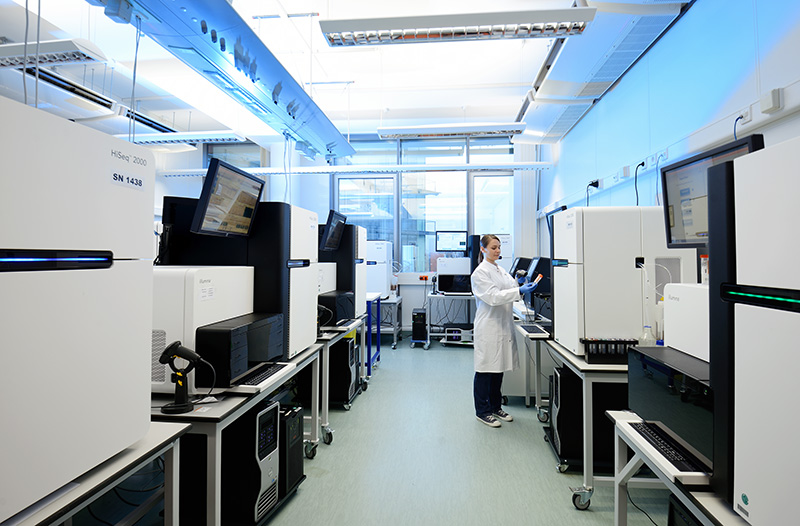01/02/2016
Print PageDKTK: Incentive for clinically relevant cancer research: Joint Funding Contest rewards outstanding methods of diagnosis and therapy

The clinical 'IvacALL' study is currently investigating the effectiveness of tumour vaccines in children suffering from leukaemia. Relapses after chemo or stem cell therapy are a major problem. Here, customized vaccines open up new treatment options: Children's immune systems are able to recognize the protein changes in tumour cells and to fight them. Therapeutic vaccines using altered protein fragments, or peptides can direct immune cells specifically to the tumour.
'As a first step, we will extensively analyse the DNA of both the patient's tumour and their normal healthy tissue in order to identify the cancer-specific alterations,' explains Peter Lang from the University Children's Hospital in Tübingen. 'Following on from that, each patient is vaccinated with a personalized peptide cocktail.' The tumour database, which was developed in the course of the study forms the basis of improved treatment options for children in the long-term. 'The technical progress in genome sequencing in recent years has made these large datasets available for individual therapies,' says Hans-Georg Rammensee at Tübingen University, one of the coordinators of the IvacALL study.
Procedure for early detection of prostate cancer enters next phase with joint funding
The clinical study 'Ga-PSMA-11 in high-risk prostate cancer' developed by DKFZ scientists has also received an award. This research project is based on a completely new method for the early diagnosis of prostate cancer. The prostate-specific membrane antigen (PSMA) is a transmembrane protein which is enriched in prostate cancer cells. Using a radioactive substance that specifically binds to PSMA, this enrichment can be visualized with positron emission tomography (PET), precisely marking the tumour tissue and any metastases.
'We currently have no reliable early non-invasive diagnostic method for prostate cancer,' explaines Klaus Kopka at the DKFZ. 'The Joint Funding now enables us to test PSMA diagnostics in a clinical study at the DKTK sites.' The DKTK investigators will look at a large number of tissue samples from prostate cancer patients and compare the findings using PSMA diagnostics. This method also presents a potential clinical approach for cancer therapy: If labeled with a strongly radioactive marker, the PSMA-binding substance could also specifically destroy cancer cells.
Know thine enemy: Non-coding mutations change the gene activity in malignant tumours
So far, the focus of genetic tumour analysis has been on mutations that result in altered proteins. They are often considered to be the trigger for malignant tumours. 'Identifying and understanding non-coding mutations in cancer genomes is a project that goes an important step further and traces mutations in tumour cells that do not lead to altered proteins, but are located in regions that change the activity of important cancer genes. Plans include investigations particularly on skin tumours (melanoma) and brain tumours (glioblastoma). Alfred Nordheim from Tübingen University points out that 'being able to identify these mutations in a collaborative effort represents a major chance to track down the causes of cancer.'
Patient-specific tumour profiles are recorded throughout Germany
The DKTK project 'Molecular Stratification Program' at the National Center for Tumour Diseases (NCT) in Heidelberg focuses on customized therapies. The term 'stratification' refers to the initiative to assign patients with the same initial diagnosis to subgroups according to molecular results in order to be able to offer them a tailored therapy. The project promotes the development of a central database containing gene defects and changes in gene activity of tumour cells. The tumour profiles will help hospitals to tailor therapy for individual patients. Stefan Fröhlich at the NCT is optimistic that 'this programme will prove to be a motivating force for the development of an individualized cancer treatment and at the same time give new stimulus to the field of applied basic research.'
Wilko Weichert, one of the coordinators at the Technical University in Munich is delighted about winning the contest and explains that 'by combining the expertise within the DKTK, we will certainly be able to improve the therapeutic options for cancer patients throughout Germany.'
*The German Cancer Consortium (DKTK) was founded as one of 6 German Centres of Health Research (DZGs) and is a long-term joint initiative by the German Federal Ministry for Education and Research (BMBF), the federal states involved, German Cancer Aid (Deutsche Krebshilfe) and the DKFZ. The consortium brings together high-ranking institutes from Berlin, Dresden, Essen/Dusseldorf, Frankfurt/Mainz, Freiburg, Heidelberg, Munich and Tübingen, working jointly toward the main goal of enhancing the translation of research from bench to bedside. The Consortium promotes interdisciplinary research at the interface between basic and clinical research, as well as clinical studies on innovative therapeutic and diagnostic methods. A further key focus is on building research platforms in order to expedite personalized cancer therapies and improve the diagnosis and prevention of cancer.
An image for this press release is available at
http://www.dkfz.de/de/presse/pressemitteilungen/2016/bilder/DKFZ_Sequenzer_1716.jpg
Legend: The DKFZ operates one of the largest centres for genome sequencing. High-throughput sequencers are used to detect characteristic DNA changes.
Source: Tobias Schwerdt, DKFZ